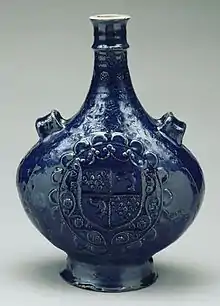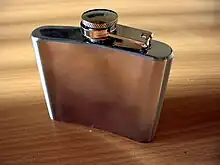flask
English



Etymology
From Middle English flask, flaske (“case, cask, keg”), from Old English flasce, flaxe (“bottle, flask”) and Medieval Latin flascō (“bottle”); from Frankish *flaskā; whence also Dutch fles; both from Proto-Germanic *flaskǭ (“braid-covered bottle, wicker-enclosed jug”) (whence also German Low German Flaske, Fless, German Flasche, Danish flaske), from Proto-Indo-European *ploḱ-skō (“flat”) (whence also Lithuanian plókščias, Czech ploský, Albanian flashkët), or from Proto-Indo-European *pleḱ- (“to weave”).
Sense 2 from Italian fiasco and sense 3 from Middle French flasque (“powder flask”), itself from Old Spanish flasco, frasco, both from Late Latin above.
Pronunciation
- (Received Pronunciation) enPR: fläsk, IPA(key): /ˈflɑːsk/
- (General American) enPR: flăsk, IPA(key): /ˈflæsk/
Audio (US) (file) - Rhymes: -æsk
Noun
flask (plural flasks)
- A narrow-necked vessel of metal or glass, used for various purposes; as of sheet metal, to carry gunpowder in; or of wrought iron, to contain quicksilver; or of glass, to heat water in, etc.
- A container used to discreetly carry a small amount of a hard alcoholic beverage; a pocket flask.
- (sciences) Laboratory glassware used to hold larger volumes than test tubes, normally having a narrow mouth of a standard size which widens to a flat or spherical base.
- (engineering) A container for holding a casting mold, especially for sand casting molds.
- A bed in a gun carriage.
- (The addition of quotations indicative of this usage is being sought:)
Derived terms
Translations
|
|
|
|
|
Danish
Dutch
Middle English
Alternative forms
Etymology
From Anglo-Norman flascon, from Frankish *flaskā, from Proto-Germanic *flaskǭ. Reinforced by existing Old English flasce, from the same source.
Pronunciation
- IPA(key): /ˈflask(ə)/
Noun
flask (plural flaskes) (rare)
Related terms
References
- “flask, n.”, in MED Online, Ann Arbor, Mich.: University of Michigan, 2007, retrieved 2018-05-04.
Old Frisian
Alternative forms
Etymology
From Proto-West Germanic *flaiski. Cognates include Old English flǣsċ and Old Saxon flēsk.
Pronunciation
- IPA(key): /ˈflaːsk/
References
- Bremmer, Rolf H. (2009) An Introduction to Old Frisian: History, Grammar, Reader, Glossary, Amsterdam: John Benjamins Publishing Company, →ISBN, page 28